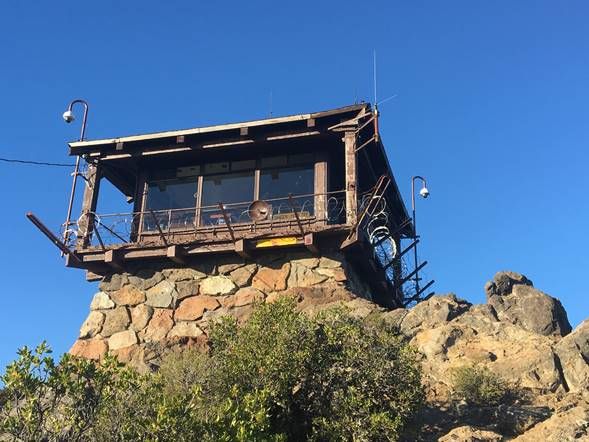PG&E testing artificial intelligence that could expand wildfire detection capabilities

Two HD smoke-spotting cameras on top of Mount Tamalpais are included in PG&E’s artificial intelligence pilot program (pictured on top two different poles).
138 new HD cameras installed in 2021 and 487 cameras are now in operation: 46 with AI test software
– During extremely dry, hot, and windy weather, being able to differentiate wildfire smoke from fog and other false indicators is invaluable to analysts in Pacific Gas and Electric Company’s (PG&E) Wildfire Safety Operations Center and fire agencies. That’s why PG&E is testing artificial intelligence (AI) and machine-learning capabilities in the growing network of high-definition cameras across Northern and Central California to see how it can enhance fire-watch and response capabilities.
This year, PG&E, in collaboration with ALERTWildfire, has installed 138 new HD cameras across high fire-threat districts, in accordance with its 2021 Wildfire Mitigation Plan. Of those 138 cameras, 46 of them are included in the new AI testing program in partnership with Alchera and ALERTWildfire.
A similar pilot was conducted with Pano through participation in EPRI’s 2021 Incubatenergy Labs Challenge. PG&E began installing HD cameras in 2018, as part of its Community Wildfire Safety Program. As of Oct.31, 487 cameras are now in operation.
“Even with the two significant rainstorms in October and November, we are still in a historic drought and California, along with other western states, continue to experience an increase in wildfire risk and a longer wildfire season. We are using every new tool and technology at our disposal to improve situational awareness and intelligence to help mitigate and prevent wildfires, including this new AI capability,” said Sumeet Singh, PG&E Chief Risk Officer. “Every bit of data and intelligence that comes to us could potentially save a life.”
The pilot program is already demonstrating the AI’s potential to reduce fire size expansion. On Aug. 4, PG&E’s Howell Mountain 1 camera located in Placer County and equipped with Alchera’s AI software, spotted smoke one minute before the actual fire dispatch and several minutes sooner than the manual movement of the camera. That smoke ended up becoming the River Fire. This is one example of many noted during both pilots confirming the value of early fire detection technology.
The expert staff in the company’s Wildfire Safety Operations Center (WSOC), outside agencies and first responders use the fire-watch cameras to monitor, detect, assess for threats, and respond to wildfires. The AI test programs includes PG&E determining a way to get the new data to the right people quickly and effectively. The quicker the data is received, the more rapidly first responders and PG&E can confirm fires and move the right resources to the right place.
“The software analyzes the video feed and if it thinks it sees smoke, we receive an alert via email and text, telling us it just detected smoke. Our analysts then pinpoint where the smoke is coming from and determine if it’s a car fire, dumpster fire, or even a vegetation fire. Based on the location, we can assess for threat to the public or PG&E facilities,” said Eric Sutphin, Supervisor at PG&E’s WSOC who’s in charge of the camera installations. “The AI filters out a significant number of false positives, for example, ruling out dust, fog or haze.”
Sutphin explained that the recent installation of the AI test software with its machine-learning capabilities means the WSOC team is getting smarter over time with more experience and more data gathered.
“We know the cameras are doing well at spotting wisps of smoke from long distances. We plan to assess our initial implementation, continue to gather the data, and develop a plan for using this leading-edge technology on a more expanded basis,” he said.
The cameras provide 360-degree views with pan, tilt and zoom capabilities and can be viewed by anyone through the ALERTWildfire Network at www.alertwildfire.org. By the end of 2022, the company plans to have approximately 600 cameras installed, providing an ability to see in real-time more than 90-percent of the high fire-risk areas it serves.
For more information, visit www.pge.com/ and http://www.pge.com/about/newsroom/.




















